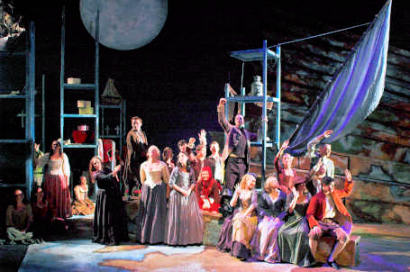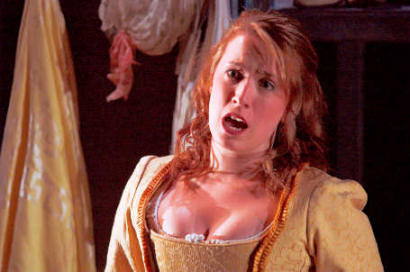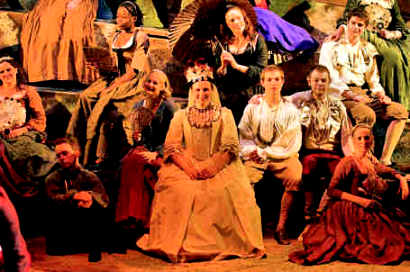|
Editorial Board
Melanie
Eskenazi
Webmaster: Len Mullenger
|
Seen and Heard Opera / Musical
Review
Musical Director: Tim Rhys-Evans
Everyone should see this production and in fact, some people need to see it. It's slick, it's funny, it's magnificently sung and acted but that's not the whole story by any means. Actually, it's joyous, that's what it is, and it was all put together in the space of three weeks. The result is so fresh and energetic, that it's positively therapeutic: you come away from it feeling better.
Welsh National Youth Opera is part of the WNO MAX education initiative. Once each year, WNYO recruits young singers and instrumentalists (aged from 14 - 25) from auditions held in November. They meet on a project by project basis, to explore and expand their musical and dramatic skills and are taught and coached by experienced professionals. The aim is to present work relevant to young people to the highest standard possible and after learning to have confidence in one another and to focus on ensemble as well as individuality, the group stages a summer show - this year sadly for only three performances.
After the success of last year's production The Tailor's Daughter by Brian Irvine and Greg Cullen, the decision to stage Candide in John Caird's 1999 Royal National Theatre version, presented a bigger challenge. With 16 scenes, over 30 locations, 300 plus characters, 4 boats and a couple of sheep, the fifty - odd strong group certainly had its work cut out as did Nik Ashton and Tim Rhys-Evans along with the rest of the production team - which this year included not only voice coach Miriam Bowen but also nine mentors from the full-time WNO Chorus. The result was a genuine triumph with hardly a note or a stage move out of place, even on the nerve-racking first night.
Apart from the self-evident competence of the cast, it was the astonishing sense of teamwork and complete lack of personal self-centredness that impressed so strongly in this production. The whole company really did pull together as an ensemble and there was no sense whatever from the principals that they were more important than anyone else. It was simply the case that everyone involved, including the musicians in the twelve piece band, worked hard and cooperatively to make their shared big moment succeed, which it did without any doubt.
In this version, the story is narrated by Voltaire himself, who also doubles as Pangloss as the narrative unfolds. Together with Candide, Cunégonde and the Old Lady, he makes up the quartet of 'principal' principals while all the other parts are played by people who also sing in the chorus in scenes where their roles don't feature. The production uses a simple set design of a high stepped wall in front of a backdrop within which a full moon and stars appear as necessary. Three four-sided towers of movable shelving contain props (a model ship, bits of pottery and so on) to suggest the location of each scene. These towers and a number of boxes on wheels, which double as treasure chests, boats and even a grave, together with sections of the stepped wall which open to make doorways, combine to build a brilliantly flexible set that can be moved around as necessary by members of the cast and chorus. It's simple, it's elegant and when helped along by thoughtful lighting and matching eighteenth century costumes, it looks exactly right all the time.
Most importantly though, this is great entertainment, due first of all to Nik Ashton's masterly directing and Tim Rhys-Evans beautifully sensitive conducting. Everyone sings and acts wonderfully and both Bernstein's surprisingly tricky score and the slick lyrics and dialogue come marvelously to life. The music bounces along when it needs to but it's expansive too and never once seems too difficult for relatively inexperienced singers. A great achievement.
So far as the singing goes, it's almost unfair to mention particular cast members without due respect for the others. But having said that, fairness does require noting the contributions from Alan Winner (Voltaire, Pangloss) Wyn Davies (Candide) Elizabeth Garton (Old Lady) and Elisabeth Toye (Cunégonde.) Each of them deserves proper credit for their remarkable talents as singer / actors and also for their extraordinary presence of mind in recovering from a (very) few minuscule first night glitches.
What surprised me most though, as a hardboiled,
long-in-the-tooth opera hack, was to find myself moved
near to tears not once but twice during this performance.
The first time was on seeing the cripplingly funny Eldorado
sheep (Leigh Rhiannon Coggins and Rhian Lois Evans) whose
eyelash-batting, gormless adoration of the humans was
a wonder to behold: and the second was on hearing the
sheer beauty of the chorus's a capella singing
in the middle section of 'Make Our Garden Grow.' It turns
out that I'm a sentimental old fool after all; but then
I did say the show was therapeutic.
Pictures © Kirsten McTernan 2006
Back to the Top Back to the Index Page |
| ||
|
||||





